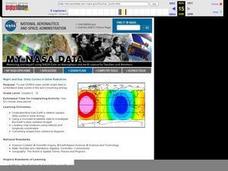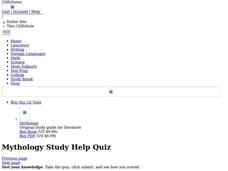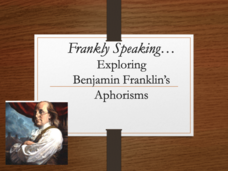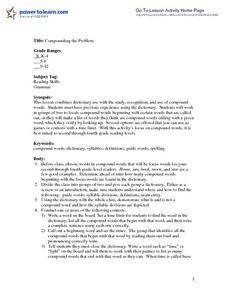Discovery Education
Solar System Scale
Extremely large or extremely small numbers are difficult to comprehend. To help understand the massive scale of the solar system, learners complete two activities. First, they create a model to compares the size of the bodies in the...
Curated OER
NIGHT AND DAY: DAILY CYCLES IN SOLAR RADIATION
High schoolers examine how Earth's rotation causes daily cycles in solar energy using a microset of satellite data to investigate the Earth's daily radiation budget and locating map locations using latitude and longitude coordinates.
American Museum of Natural History
What is Astronomy?
Go study the universe. Pupils learn seven aspects about astronomy and astronomers. They begin to learn about constellations; distance and motion between objects; gravity; the electromagnetic spectrum; dark matter and energy; and teams of...
BBC
Sound and Hearing
First and second graders recognize that sound is generated in a variety of ways, and that it comes from many different sources. They explore tone and volume, realizing that there are different ways to describe sound. Some musical...
BBC
Light and Shadows
Light is such an amazing thing! Elementary schoolers explore the wonderful world of light and shadow. The lesson is meant to be carried out on a whiteboard. Objects are placed in front of a light source, and learners must predict what...
BBC
Ourselves
Young biologists identify parts of the body, sort humans from other animals, and list the difference they see. Learners are split up into groups of three, and each group must find pictures in magazines of humans and other animals. They...
Curated OER
Mythology Study Guide
After exploring the wonderful world of mythology, give your high schoolers this multiple choice quiz to assess their ability to recall pertinent information. There are 15 questions posed, and users can press "submit" to receive immediate...
Curated OER
Comparing Poems
Young literary analysts compare two poems by the same author. Readers look for slant rhyme, observe the beat and rhythm of each, and search for repeated vowel sounds. After re-reading, they observe the lack of punctuation and the stanza...
Denver Art Museum
Descriptive Haiku
Even though this is technically an art lesson, haiku poetry is actually the main focus! Learners view photographs of Japanese tea caddies. They list five descriptive words for the caddies, then write haiku poems using the caddies as...
K5 Learning
Why Does the Ocean have Waves?
Six short answer questions challenge scholars to show what they know after reading an informational text that examines waves—what they are, what causes them, and how different Earth factors affect their size and strength.
Chandler Unified School District
Frankly Speaking: Exploring Benjamin Franklin's Aphorisms
Benjamin Franklin famously had an aphorism for every situation—most of which we still use in modern vernacular. Introduce class members to Franklin's Poor Richard's Almanack with a presentation that details the characteristics of aphorisms.
Space Awareness
Meet Our Home: Earth
Earth is a complex structure. Learners explore their home, the earth, using a fun hands-on activity. They create tactile models of the earth using ordinary household materials that represent some common features: land, polar caps,...
Curated OER
Solar System Challenge
In this solar system worksheet, students complete 13 multiple-choice questions to demonstrate their knowledge of the solar system.
Curated OER
The Work of Waves and Wind
This is not revolutionary, but it is informative. Earth science viewers in grades 7-12 get carried away with wave and wind erosion. They view diagrams of how waves impact ocean shorelines. They see examples of the different types of sand...
Curated OER
Concepts of Beauty Put Into Words
Studying haiku poetry with your English class? Delving into Japanese history with your world history class? Here is an authentic and creative way to explore Japanese culture more deeply. Pupils will compare and contrast two tea caddies...
Curated OER
Solar System Crossword
In this solar system crossword puzzle worksheet, students use the 13 clues and the terms in the word bank to help them correctly complete the word puzzle.
BBC
Sorting and Using Materials
First and second graders see that everyday objects are made from a variety of materials. They interact with objects such as keys, plastic spoons, a wooden ruler, a towel, and a plastic bag. A discussion ensues which leads them to...
Curated OER
Compounding the Problem
Pupils sharpen their dictionary skills and their understanding of compound words in this plan. Tailor it to the grade level you teach by honing in on specific skills. For older learners, the plan suggests providing a word and having them...
Curated OER
Mother Nature Has Her Say
Young scholars use their creative writing skills to develop interview questions for Mother Nature. Using writing, they respond to the questions another student developed and use the internet to research any topic they need more...
Curated OER
On The Day You Were Born
Students engage in a study about the holiday of a birthday with the help of using children's literature. They make cognitive connections of using the characters of the book and relating them to the personal celebration of a birthday.
Curated OER
Water 1: Water and Ice
Students explore forms that water can take. In this science instructional activity, students participate in hands-on activities that require them to change water to a solid and back to a liquid again.
Curated OER
Sunny Delight
First graders explore completing experiments through the scientific method.
Curated OER
Salinity
Students take a provided ocean Trivia Quiz in order to start a discussion of the ocean. They then perform an experiment on how the amount of salt in the ocean affects it and varies from ocean to ocean.
Curated OER
Gravity Gets You Down
Students investigate the force of gravity and how it effects different objects that are put into acceleration when applied the experiment of free falling. They drop different objects that have a variety of masses and some that cause air...
Other popular searches
- Earth Moon Sun System
- Earth Sun and Moon
- Earth/sun/moon
- Sun and Moon Observations
- Sun Moon Earth
- Earth, Sun and Moon
- Space, Sun and Moon
- Earth and Moon and Sun
- Sun Moon Stars
- Moon, Sun and Stars

























